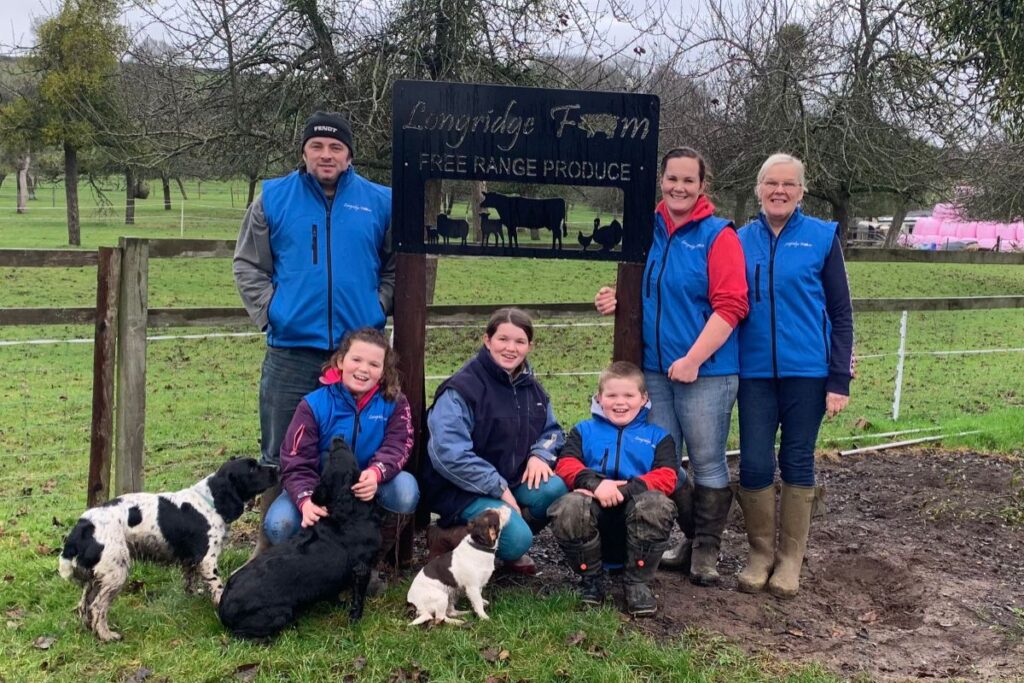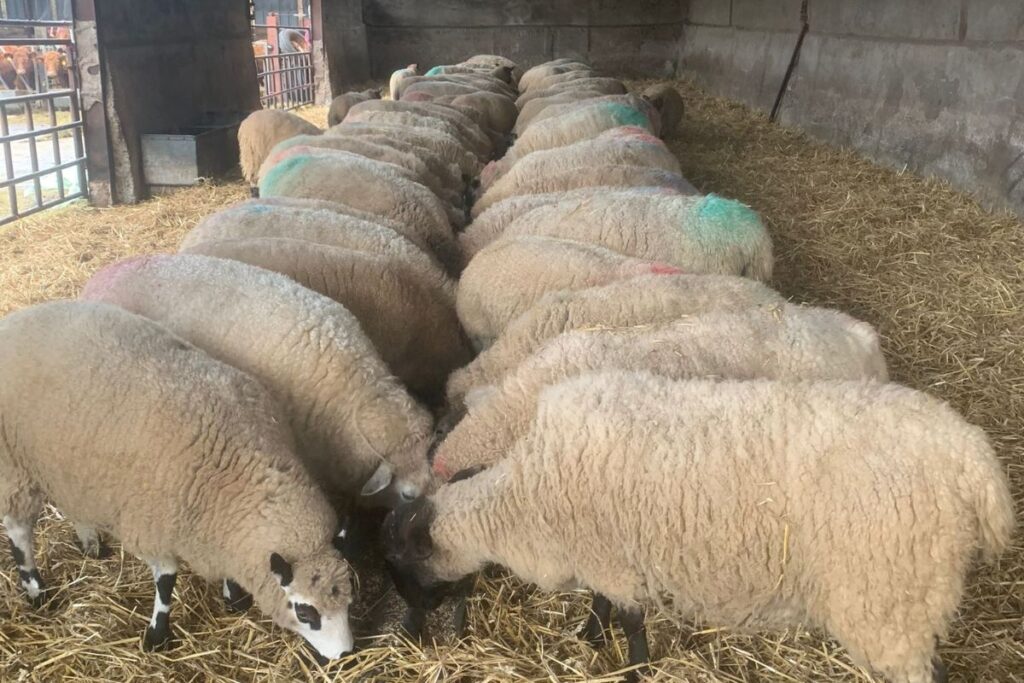That’s Farming editor, Catherina Cunnane, in conversation with Helen Griffiths (39) in this week’s Women in Ag segment.
“I am from Ashleworth, Gloucestershire, and we are a small family farm, where I am the third generation.
I live in the next village with my husband, Richard (known as Griff), in a tied cottage to his job as foreman on a large arable and livestock farm, as well as our three children, Harriet (13), Chloe (12), and Charlie, (10).
Longridge Farm is run by myself and my husband. I manage the day-to-day aspects of the farm Monday-Friday when my husband is at his main work.
He is predominantly around during evenings and weekends and typically takes annual leave from his job at our busy times… i.e. lambing, turkey plucking, haymaking, mucking out sheds, hedge-cutting etc.
The remainder of the work requires the two of us to complete on weekends and evenings.
At his main work, the technology/tractors/equipment is pretty much state-of-the-art/new/up-to-date.
A labour of love
So, it is sometimes a labour of love for Griff to come back to Longridge and use the much, much older kit, but he does it lovingly because it is ours, and we own it all outright.
He works hard in his job but even harder when it is for us.
Day-to-day work for me involves checking the livestock, feeding/scraping out/bedding up in the winter and any other relevant livestock tasks needed.
I manage the cider apple harvest and organise any orders/deliveries required for the farm throughout the year.
I run the livery yard alongside my mum and am responsible for all social media and meat sales (from abattoir to butcher, labelling, taking orders and delivering).
The farm when I was a child was run by my grandad and then later as a partnership between my dad and uncle.
It was a small dairy farm with a decent size flock of sheep. Traditional orchards also produced cider and jam fruit.
As quotas were brought in as well as foot & mouth and BSE crisis’s – my dad eventually left the farm to a career of an agri engineer, which he had trained up to be before taking on the partnership.
My uncle then proceeded to run both parts of the farm. All this occurred whilst I was still at school.

Veterinary nursing science degree
Fast forward to 2005, and my husband and I took the farm on when I finished at uni, where I had just graduated with a veterinary nursing science degree from Hartpury College (the University of the West of England).
We started with a purchase of 40 ewe lambs with savings that my now husband had.
Later on, my dad purchased more sheep to help build up the flock, and we went into partnership (all alongside our full-time jobs).
I was a full-time lecturer in animal care and then later agriculture at Hartpury College.
When Griff and I had children, we decided that I would return to lecturing but only on a part-time basis.
It was then that we decided to venture into the meat box business to add extra income to the farm.
We started with lamb boxes and gradually, over the years, branched out to pork, chickens, beef and turkeys, slowly but surely building up the business again, all alongside our full and part-time jobs.
Sadly in 2017, my dad died after a five-year battle with cancer. This was a pivotable point for us as the decision was to either push the farm to become more profitable or step away completely.
It was at the time that I became a full-time member on the farm and stopped lecturing completely.

Present day
The farm consists of 50 head of a closed Dexter beef cattle suckler herd, 120 breeding ewes with Charollais, Suffolk and Kerry Hill tups, a dairy goat rearing system for meat, a small-scale pig rearing system, and 100 turkeys each Christmas.
In addition, we run a small livery yard (11 spaces), maintain and use a traditional orchard for cider fruit, cooking apples and plums – all of which are sold to small-scale local producers of cider and jam etc.
We do all of the work ourselves and often draft my mum – who is a silent partner on the farm – in to help with turkey dressing, livestock moving, livery yard work and childcare.
We contract in a shearer (my brother) but do all of the other work ourselves.
My husband is the combine driver on the farm where we get our straw, so we contract out the big baling.
However, I have recently started baling the small bales and hauling all the bales in myself back to the farm – failing that, my brothers will help as and where they can after work. Both are tree surgeons.
Our three children all play a very important role on the farm, and all genuinely love the farm.
It is an absolute joy to be able to provide the lifestyle and upbringing to our children that myself and my husband had ourselves.
Farming life
During the winter, at least half of the farm has the tendency to flood as we are right on the flood plain of the River Severn.
We, therefore, house all livestock except a few store lambs from December onwards. We, therefore, lamb early in January to be able to hit the early lamb trade.
All of our beef, pork, turkeys and goat meat are sold straight from the farm in our meat boxes and currently, 60% of our lamb.
The other 40% of lambs go to a local collection centre and are sold commercially.
We attend a local craft and produce market once a month and also offer collection from the farm as well as offering local delivery.
I have now taken on a few hours a week lecturing again at Hartpury College in the agriculture department, where I predominantly teach livestock production.
I am fortunate that when I am lambing or through busy times on the farm, I can bring the students with me for hands-on experience within the industry.
Also, I enjoy connecting with the ag students; typically, they have not overly enjoyed school, and so at college completing a topic they enjoy, you get to see them flourish.
It is also really good to see so many more girls coming through the farming courses.

Future plans for the farm
I feel we are at capacity in terms of the number of livestock that we have.
Expansion of any of those enterprises is sadly limited unless we choose to rent any further ground, which comes with its own set of uncertainties.
I do see more expansion in the education side of the farm, potentially more students coming from the college for hands-on experience and maybe even more of our own livestock-related courses.
We have met many, many challenges, most of them financial.
As a small farm, it is very difficult to utilise many of the grants and schemes available, mainly because they all require an initial outlay of money before being able to claim the money back.
But slowly and surely, as we have saved money, we have gradually upgraded parts of the farm, a new cattle sheds that my dad designed; then, as a group effort, we built together, upgraded tractors, upgraded machinery etc.. anything to become more efficient.
Father’s passing
By far, the biggest challenge we faced was the death of my dad, with him gone, we were left to forge on.
At the time, my machinery skills were basic – I could turn the hay and do basic movements with the loader tractor, but that was really it, as my interest is really in the livestock side of the farm.
With both my husband and dad around, there was no real need for me to drive/operate them.
Griff was actually the driving force behind many of my farming achievements from this point onwards.
He has complete faith in me and often pushes me far out of my comfort zone, which is often infuriating but so so worth it.
Because of him, my skillsets have expanded rapidly since the death of my dad, and despite the many tears I have shed when I have not wanted to drive the tractor, reverse the big trailer, haul the bales, drive the telehandler, bale the straw – he has absolutely pushed me to do it and then revelled in the achievement with me.
Women in Agriculture
I think women are really starting to make their mark in agriculture now.
I think there will always be discrimination of some sort, but I think the positive contributions from women to the industry far outweigh that.
Moreover, I do believe that women are getting more and more recognition (and rightly so) within the industry.
Our farm vets are predominantly female, same for our local feed supply reps.
I have many female friends who are either farming and/or part of the industry somehow.
I think that it is generally more accepted that females in the farming workplace are now the norm rather than it being unusual or even something to comment on, which is great.
There are more and more girls coming through the agri courses at Hartpury College, and their interest and passion for the industry really shines through.
I absolutely love my life and would do it all over again in a heartbeat.
Of course, we would love to have my dad back, but I like to think that he would be proud of what we have achieved.
Longridge Farm has been an absolute labour of love.
Blood, sweat and many, many tears have gone into pushing the farm to where we are today, and we are so proud of what we have and continue to produce and achieve.”
To share your story, email – [email protected]
See more Women in Ag profiles.





